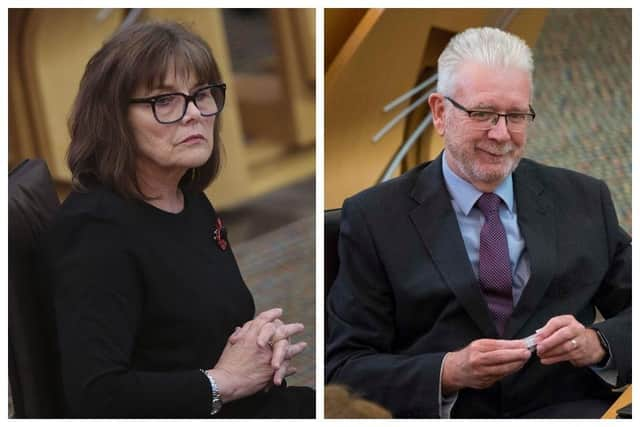Former SNP ministers claim UK Government 'do not understand devolution'
This article contains affiliate links. We may earn a small commission on items purchased through this article, but that does not affect our editorial judgement.
Jeane Freeman, the former health secretary, and Michael Russell, the former constitution secretary, made the claims in newly-published interviews with the Institute for Government.
Ms Freeman, who worked as both a senior civil servant and a special adviser before being elected to the Scottish Parliament in 2016, said her experience of working with the UK Government showed Westminster’s “fundamental flaw” in its understanding of devolution.
Advertisement
Hide AdAdvertisement
Hide AdThe former politician, who served as health secretary from 2018 until the Holyrood election last year, also revealed she had an argument over “whose citizens were whose” with then-UK health secretary Matt Hancock in her first session with him at a COBRA pandemic meeting.
She said a “running thread” of working with the UK Government, including when it was Labour-run, was that it and the civil service “do not understand devolution”.
“They simply don’t understand it and they have paid no attention to it”, she said. “And they don’t understand what has happened in the political culture of Scotland and the citizens’ view in Scotland, regardless of whether or not people support independence or oppose independence, in the 20-odd years since the Scottish Parliament was established.
"It’s not the same as it was 20 years ago. So you kind of need to get with the programme and understand it, otherwise you’re going to take a very outdated view of who the Scottish Government is and what they do and how they’re perceived, which is independent of whether or not people in Scotland support the politics of any one Scottish government.


“And that is a fundamental flaw that rests at Westminster. I think we understand Westminster pretty well. I just think they just don’t get devolution.
"They don’t see the point of devolution sometimes and they really don’t understand that they’re dealing with another government that’s not subservient to them.”
Mr Russell, who served in both Alex Salmond and Nicola Sturgeon’s administrations, said the UK Government did not believe there should be “real difference”.
This was something he found when, as education minister, he moved Scotland towards free tuition fees against external pressure.
Advertisement
Hide AdAdvertisement
Hide AdHe said: “The UK Government always finds it very difficult to believe that you are going to do anything that departs from what they do, you know.
"The idea of devolution is all very well. I mean at that stage, people thought it was all very well, most of them really hate it now.
"But you know, [their attitude was that] devolution was all very well, but it shouldn’t mean real difference.”
Mr Russell also revealed a phrase shared by other devolved nation ministers about Michael Gove.
He said: “Leighton Andrews [minister for education and skills in Wales] used to have a phrase “you’ve been Gove’d”, because whatever you did, Gove would be charming to your face and would then go out and brief savagely against you and that’s just how things were and how he is. So there was a pressure there.”
Mr Russell said once Boris Johnson had entered Downing Street, Brexit negotiations involving devolved administrations “made no difference at all”.
The former SNP MSP said: “I think the difference between the May and Johnson administration[s] is that there was a recognition under May, no matter how limited and grudging, of the legitimate interests of the devolved governments and their rights, whereas there was nothing, but contempt for devolution from the Johnson Government, expressed at every level, even by the territorial secretaries of state.”
The sixth and final episode of the brand new limited series podcast, How to be an independent country: Scotland’s Choices, is out now.
It is available wherever you get your podcasts, including Apple Podcasts and Spotify.
Comments
Want to join the conversation? Please or to comment on this article.

